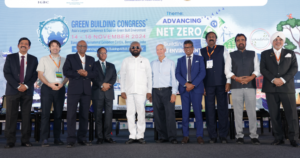15 Nov 2024: The CII Indian Green Building Council (IGBC) inaugurated the 22ND edition of the GREEN BUILDING CONGRESS. The Congress held at the Bangalore International Exhibition Centre was graced by Shri Eshwar Khandre, Hon’ble Minister of Forest, Ecology and Environment, Govt. of Karnataka; Mr. Sharan Kumar Modi, Board Members, Karnataka State Pollution Control Board; Mr. Jamshyd N Godrej, Chairman CII-Sohrabji Godrej Green Business Centre; Mr. Jeff Oatman, Chair, Asia Pacific Regional Network WorldGBC; Mr. B Thiagarajan, National Chairman, Indian Green Building Council; Mr. C Shekar Reddy, National Vice Chairman, Indian Green Building Council; and, Mr. N Venu, Chairman, CII Karnataka State Council. The Congress brought together industry experts, policymakers, architects, builders, and sustainability advocates to discuss innovations, trends, and policies shaping a greener future in India and beyond.
The Green Building Congress 2024 has as its theme – “Advancing Net Zero in Buildings and Built Environment”- and it aims to spread awareness and advocate for the adoption of green building practices and certifications, helping reduce the environmental footprint of construction and urban development. It is a platform for policymakers, industry leaders, and stakeholders to collaborate on establishing sustainable building codes, regulations, and industry benchmarks and support India’s commitments to sustainability and carbon reduction, contributing to national objectives like achieving net-zero emissions and promoting climate-resilient infrastructure.
The Government of Karnataka is the state partner for the CII IGBC Green Building Congress 2024 and is a leader in sustainable development. Through the ‘State Climate Action Plan, Beyond Bengaluru,’ the state aims for Net Zero in waste, water, energy, and carbon. Karnataka promotes environmental protection and climate resilience through key initiatives:
- Green Index for Sustainable Infrastructure evaluates projects on sustainability, considering factors like energy efficiency, recycled materials, and pollution control.
- The Bengaluru Climate Action and Resilience Plan (BCAP) targets net-zero emissions by 2050, focusing on energy, transportation, waste, water, and urban planning.
- The State Action Plan on Climate Change (KSAPCC) addresses environmental challenges, with a ₹52,827 crore investment in afforestation, water management, and corporate climate action through CSR.
- The KHIR City project, a ₹40,000 crore urban development near Bengaluru, aims to create a sustainable city with eco-friendly housing, advanced transportation, and green spaces, generating one million jobs.
Shri Eshwar Khandre, Hon’ble Minister of Forest, Ecology and Environment, Govt. of Karnataka while addressing the Congress, said “Karnataka’s commitment to sustainability is on full display with over 1,100 building projects adopting green practices, setting a strong example for environmentally responsible urban development. Hosting the Green Building Congress 2024 further reinforces this commitment, adding momentum to our drive for NET Zero emissions and resilient, green infrastructure. This local action aligns with the priorities at COP29 in Baku, where global leaders are advancing climate finance initiatives, adaptation strategies, and solutions for loss and damage to support communities most affected by climate change. By leading on green building projects and fostering awareness through events like the Congress, Karnataka is helping pave the way toward sustainable urban landscapes. This is a crucial step forward, demonstrating the importance of proactive, localized initiatives to meet global climate targets and create a more resilient future.”
Mr. Jamshyd N Godrej, Chairman, CII-Sohrabji Godrej Green Business Centre while addressing the event focused on the importance of managing carbon emission produced by the building sector which is responsible for 37% of global carbon emissions, making it important to address both operational and embodied emissions. He also emphasized transparency in emissions data and stronger partnerships across the value chain which are crucial for achieving net-zero goals. “IGBC has launched a Green Cooling Council which will involve all the relevant stakeholders in the industry and brainstorm on what we should do to reduce the emissions on account of the existing cooling systems as well as the upcoming cooling systems.”
Speaking at the Congress, Mr. B Thiagarajan, National Chairman, Indian Green Building Council, said “The Indian Green Building Council (IGBC) is at the forefront of promoting sustainable development in India’s building sector, addressing the significant rise in resource consumption and emissions as the country adds an estimated 8-10 billion square feet annually in new commercial and residential spaces by 2030. To combat this, IGBC has launched targeted initiatives aimed at achieving Net Zero in energy, water, waste, and carbon across the sector, working closely with stakeholders to create a lasting impact.
With an ambitious goal of greening 2 billion square feet each year, IGBC’s efforts could yield substantial annual savings, including 104 billion units of energy, 320 billion litres of water, and a reduction of 83.2 million tonnes of CO₂ emissions. These sustainability efforts are further bolstered by a focus on green investment, which incentivizes sustainable practices, accelerates green job creation, and aims to lower costs in green construction.
IGBC’s leadership highlights the building sector’s crucial role in steering India toward a greener, more sustainable future, with a vision that encompasses environmental responsibility, economic opportunity, and the long-term well-being of communities across the country.”
The Government of Karnataka is driving renewable energy growth through its Renewable Energy (RE) Policy 2022-2027, supporting both state and national goals to help India achieve 500 GW of renewable energy by 2030. Karnataka ranks among the top four states in renewable energy development, with an installed capacity of 22.37 GW as of October 2024.
CII IGBC launched the Net Zero Carbon Rating, encouraging low-embodied carbon materials, optimized building performance through passive features, and the use of renewable energy and carbon sequestration to offset emissions.
Larsen & Toubro’s Technology Centre – 4 in Chennai is the first to receive the IGBC Net Zero (Design) Certification for Net Zero Energy, Carbon, Near Net Zero Water, and Zero Waste to Landfill. The building achieved 28.7% reduction in embodied carbon by diverting 92.5% of construction waste from landfills and using 57% green materials. Operational carbon was reduced through a 250 kWp rooftop solar PV plant and a water use performance ratio of 0.78.
The Green Building Congress 2024 also featured the IGBC Green Design Competition, themed “Vibrant Urban Voids: Endless Possibilities,” encouraging students to transform neglected urban spaces into vibrant public areas. In the Macro Category, two teams secured the second prize: Mr. Dhruv Kothari from Anant National University, Ahmedabad, and Ms. Aditi Kawade from the School of Environment, Mumbai, each receiving a cash award of ₹25,000. The first prize was awarded to Ms. Bhuvaneshwari and Mr. Satyam Upadhyay from the School of Planning and Architecture, Vijayawada, who won a cash prize of ₹50,000.
In the Micro Category, the third prize went to Ms. Varna Vichithran from BMS College of Architecture, who received ₹20,000. Mr. V. Swaminathan and Ms. Nada Kanhirala from IIT Kharagpur won the second prize with ₹30,000. The first prize was awarded to Mr. Priyatham U from BMS College of Architecture, Bangalore, who received ₹50,000.
The IGBC Green Your School Programme saw three schools taking the top spots this year:
- Shrimad Rajchandra Gurukul, Valsad, Gujarat
- Nalanda Public School, Mumbai, Maharashtra
- Air Force Golden Jubilee Institute, New Delhi
These schools stood out for their innovative ideas in transforming their campuses into green, sustainable spaces.



+ There are no comments
Add yours